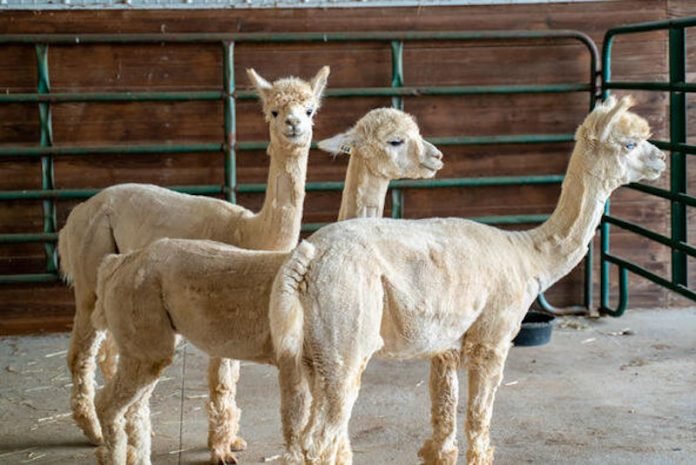
Alpacas Big Boy, Blue Eyes and Emperor may hold the key to combating COVID-19. Their antibodies could offer a defense against SARS-CoV-2, the virus that causes the disease.
University of Kentucky College of Medicine researchers are using the special antibodies made by alpacas, called nanobodies, to help understand the novel coronavirus and potentially develop a treatment that could protect people from being infected.
Nanobodies are smaller and more stable types of antibodies taken from the immune systems of camelids—which include camels, llamas and alpacas.
Nanobodies could be more effective at fighting the disease because their tiny size gives them the ability to fit into spaces on viral proteins that regular antibodies have a hard time penetrating.
“The idea is that nanobodies are small enough to access small pockets on SARS-CoV-2’s spike proteins, which is the part of the virus that attaches to host cells.
A nanobody that could block the binding of the spike protein to its cellular receptor could be an effective treatment for COVID-19,” said Sidney Whiteheart, who is co-leading the study with Lou Hersh, both professors in the Department of Molecular & Cellular Biochemistry.
With the help of Big Boy, Blue Eyes and Emperor, Hersh and Whiteheart’s research team is generating nanobodies that can bind to the spike protein and therefore, neutralize the virus.
The alpaca trio have been immunized with isolated proteins from SARS-CoV-2 and then researchers collect samples of their blood containing nanobodies produced by their immune systems.
In the lab, the nanobodies are extracted, tested, and reproduced at a larger scale for use in research and for therapeutic development.
Virus-binding nanobodies from the alpacas can confer passive immunity in humans and thus help fight a SARS-CoV-2 infection.
While passive immunity from a disease is shorter-lived compared to the protection one’s own immune response would provide, it helps protect right away—something that could be valuable as we wait for a vaccine, Hersh says.
“Nanobodies have many qualities that make them ideal for therapeutic development, particularly for COVID-19,” said Hersh.
“They are small and stable, making them easier to manipulate, and they can be produced more rapidly and in large quantities at a low cost.
They are also easily tolerated by the human immune system and could potentially be inhaled for rapid delivery to the lungs.”
Given their special properties, nanobodies are not new to the fight against disease, with researchers—including those at UK—investigating their potential against HIV and other viruses for many years.
The UK team, including Martin Chow and Craig Vander Kooi along with Hersh and Whiteheart, have shown that the alpacas are producing antibodies against the SARS-CoV-2 spike protein, and anticipate having nanobodies in the next few weeks.
They will then begin testing these nanobodies as therapeutic agents by testing for their ability to prevent SARS-CoV-2 from interacting with its target cells.
Big Boy, Blue Eyes and Emperor have contributed to UK’s nanobody research for more than three years.
While the three come to UK’s North Farm twice a year to get vaccinated and have blood drawn, they live at River Hill Ranch, an alpaca farm near Richmond.
The partnership with UK is a win-win situation, says farm owner Alvina Maynard.
The trio are favorites among those visiting Maynard’s farm for alpaca-themed field trips, camps and yoga lessons. And as part of her herd, their fleece is also used to make artisan socks, scarves and sweaters.
“They are supporting local business and we are supporting groundbreaking and potentially lifesaving research,” says Maynard. “I’m beyond thrilled that our alpacas can serve this greater purpose.”
In the past three years, the alpacas have helped UK researchers generate more than 50 nanobodies to target proteins involved in a variety of human diseases including cancer, diabetes and neurological disorders.
The current COVID-19 nanobody research is funded in part by a pilot grant from UK’s COVID-19 Unified Research Experts (CURE) Alliance and the Center for Clinical and Translational Science (CCTS). The goal is that data from the project will support more grant funding for additional research.
UK researchers also plan to share the purified nanobodies with colleagues pursuing related COVID-19 research.
Those nanobodies that bind to the spike protein could also help scientists understand more about the virus itself and how it is structured. This could aid in the development of other novel types of treatments.



